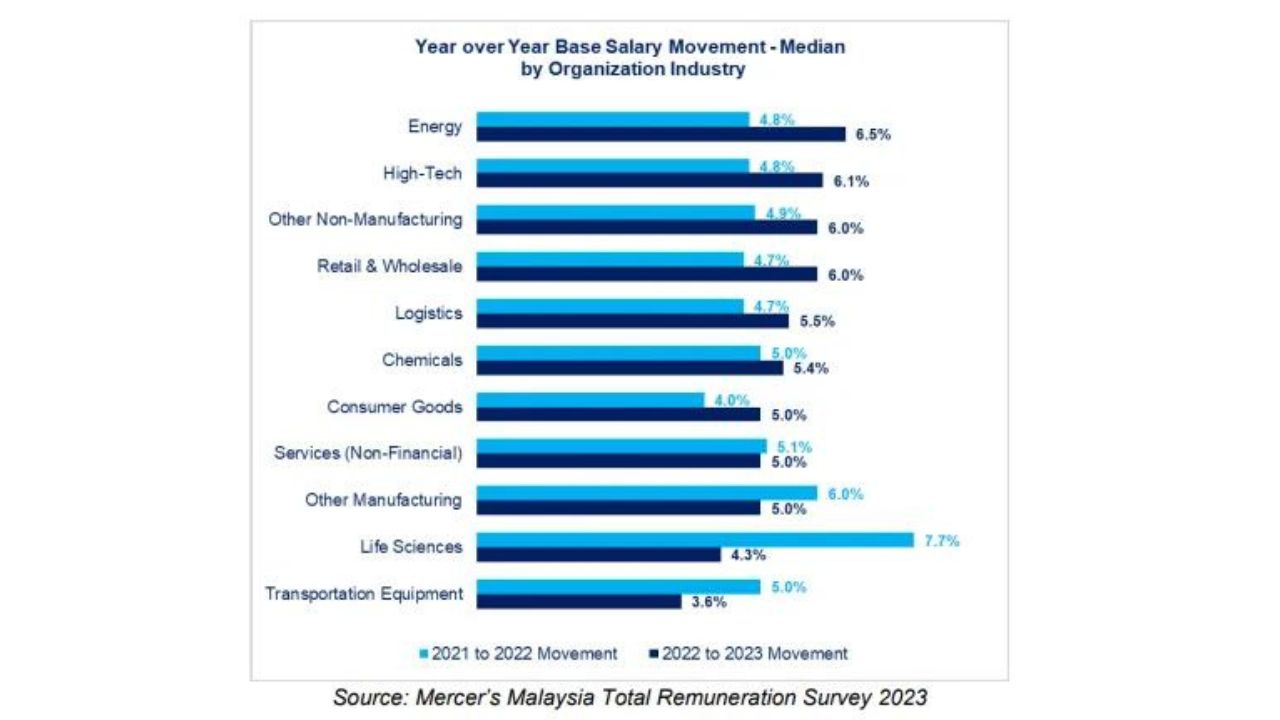Based on forecasts of the main obstacles to hiring new employees, wages will grow across industries in 2024. From 4.8% to 5.1% last year, pay increases in Malaysia are anticipated to occur. A survey involving over 660 multinational firms has been carried out; the median wage increase falls are expected to represent the different pay progressions of developed nations. Read on for more information on anticipated salary rises, the Malaysia Salary Increase 2024, and other related topics.

Malaysia Salary Increase 2024:
Most executive professional workers, management, and support personnel in Malaysian corporations are expected to receive a 5% pay raise overall. The market competitiveness index has been used to compare the base compensation of employment in the general industry to the yearly base salary of positions in vast industries. In contrast, education-related businesses such as real estate, biopharmaceuticals, life sciences, construction, and engineering underperformed in competitive pay.
It has been anticipated that employees in Malaysia will receive an overall wage rise of 5% in 2024. These, however, pale compared to the 5.6% of 2023 salaries. The average pay increase over the previous few years has been increasing steadily. These are the federal patterns being seen and are closely related to the inflation worries influencing the different aspects beyond pay increases.
The following is a list of additional nations that participated in the poll, along with the expected increase in median salaries for each in 2024:
- 9.3% in India.
- Vietnam (7.0%).
- Indonesia (6.5%).
- Philippines (5.7)
- China (5.2%).
- Thailand (4.7%).
- Korea, South (4.4%)
- Singapore (4.4%).
- Hong Kong (3.9%).
- Taiwan (3.8%).
- Japan (2.6%).
Malaysian industry-wide salary increases in 2023:
In 2023, the industries with the most significant income gains in Malaysia were the energy and high-tech sectors, with median salary growths of 6.5% and 6.1%, respectively. Here are some further noteworthy examples of Malaysia’s industry-wide median wage increases for this year:
- The industry with the most enormous income growth 2022—the life sciences sector—saw a decline to 4.3% in 2023.
- Transportation equipment had negligible growth, from 5% in 2022 to 3.6% in 2023.
- The industrial and consumer goods sectors experienced a 5% pay increase, which aligns with Malaysia’s median income.
Wage Increase Prediction 2024:
After reaching record highs, inflation is already beginning to decline, and the labor markets are changing due to voluntary turnovers and attrition rates of 18.5% in 2023 and 2024, respectively. Employers will still have to deal with severe difficulties in attracting new employees. They must pay attention to the incentives given in their complete balancing package. When it comes to needs and wants, the monetary and non-monetary will continue to compete.
The industry predicts that Malaysia’s salary increases will increase. It is anticipated that salaries in the general sectors will rise by 5.0 percent from the prior year. The asset management sector is expected to see a salary increase of 4.9, the banking sector of 4.7, the oil and gas sector of 4.9, the real estate, engineering and construction, and insurance sectors of 5.1, the education sector of 5.0, and the shared services and outsourcing sectors of 5.1 more than the actual salary increase of the previous year.
New Wage Dates in Malaysia:
Malaysia’s policy of progressive wages Workers’ salaries are progressively raised based on their performance, abilities, and experience. Thousands of businesses will be involved in their trial project beginning in June 2024. Poor pay seriously affects employees’ ability to support themselves since they must spend much of their income on savings and essentials. The bulk of the workforce works for small and medium-sized companies, which will all be impacted by the new pay policy.
According to the WTW poll, Gen Z employment has been highest in finance, insurance, IT, and others. Malaysia’s pay growth forecast for 2024 is expected to climb by more than 50% annually. The passion economy gives traditional employment the kind of assurance it formerly had. Three obstacles are preventing Malaysia’s corporate workforce from growing, and they are as follows:
The COVID-19 epidemic has created a significant career alternative in accelerated education, and as a result, the young, intelligent workforce is looking for chances abroad. This has been a severe setback for the workers. Younger workers are also content with creating new roles and their demands for autonomy, adaptability, and scalability—all of which contribute to a feeling of purpose.
The Malaysia Salary Increase would assist employees with lower incomes in covering their living expenses. With the recent wage rate hike, workers can control their federal spending. The new wage rates will be forecasted based on inflation and the growing cost of living. The increasing rate of inflation and the national cost of living—which allows individuals and families to manage their living expenses—are taken into account by the Federal Government when determining the new rates.
